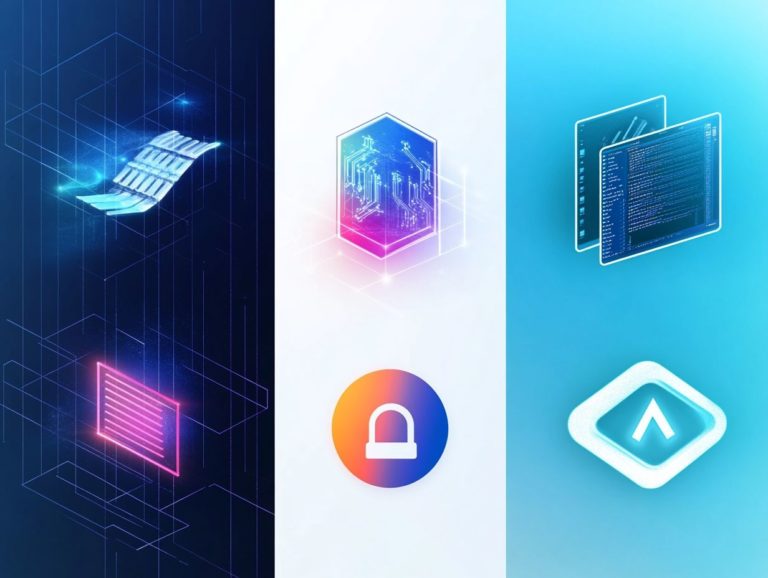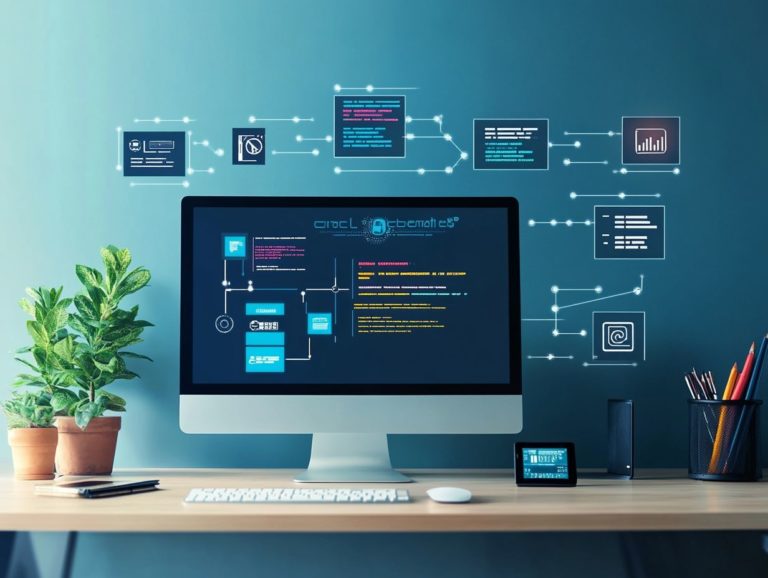The Importance of Continuous Learning in IT
In the fast-paced realm of IT, staying ahead requires more than a solid foundation; it demands a commitment to continuous learning.
This article explores the benefits of adopting a learning mindset not just for personal growth but also for the success of your organization.
From tackling common challenges and implementing effective strategies to utilizing online resources and communities, you ll find everything necessary to foster a culture of continuous learning.
Investing in your education can profoundly influence your career trajectory in the tech industry.
Contents
- Key Takeaways:
- Benefits of Continuous Learning in IT
- Challenges in Implementing Continuous Learning
- Strategies for Successful Continuous Learning
- Tools and Resources for Continuous Learning
- Impact of Continuous Learning on Career Growth
- Frequently Asked Questions
- Why is Continuous Learning Important in IT?
- How Does Continuous Learning Benefit IT Professionals?
- What Are Some Examples of Continuous Learning in IT?
- How Does Continuous Learning Contribute to the Growth of the IT Industry?
- What Impact Does Continuous Learning Have on Organizations?
- How Can Individuals Incorporate Continuous Learning into Their IT Career?
Key Takeaways:

Continuous learning is vital in IT, where technology constantly evolves. Individuals and organizations benefit, leading to greater knowledge, improved skills, and enhanced job performance. To implement continuous learning, overcome challenges and utilize effective techniques like online courses, certifications, and community engagement.
Defining Continuous Learning
Continuous learning is an enriching journey fueled by your desire to enhance your skills and expertise. This pursuit is crucial in the fast-paced IT industry, where technology evolves rapidly.
In this dynamic landscape, staying ahead means consistently updating your skills. Organizing and sharing knowledge helps you distribute valuable insights across your teams and organizations.
A growth mindset fosters resilience, allowing you to see challenges as opportunities for growth. To integrate continuous learning into your daily routine, consider e-learning platforms and a wealth of online resources.
Webinars, forums, and interactive courses are invaluable. Dedicate time each week to this learning endeavor; you ll enhance your career prospects and boost your job satisfaction while sparking innovation in the ever-evolving IT landscape.
Benefits of Continuous Learning in IT
Continuous learning offers a wealth of benefits in the IT sector, equipping you and your organization with essential tools to excel in an evolving environment.
It boosts employee engagement by fostering innovation and collaboration, ultimately enhancing performance and improving knowledge retention.
Prioritizing upskilling helps you stay in tune with industry demands, granting you a competitive edge in the digital landscape.
Advantages for Individuals and Organizations
Continuous learning presents distinct advantages for you and your organization, enhancing professional development through numerous upskilling opportunities while nurturing mentorship and collaboration.
This translates into greater job satisfaction, as you gain confidence in your role and feel better equipped to bridge skill gaps. Your organization benefits from improved market adaptability, thanks to a well-trained workforce that can adjust to new technologies and industry trends.
In today’s fast-paced job landscape, continuous learning helps you build resilience, enabling you to embrace challenges rather than shy away from them. Companies like Google and Amazon exemplify this with immersive training programs that significantly boost employee engagement and innovation.
Participants often find enhanced skills and renewed passion for their work. Organizations that prioritize learning see improved retention rates; employees are more likely to stay loyal to companies that invest in their growth.
This mutual investment fosters a culture of excellence, making your organization not only competitive but also a highly desirable place to work.
Challenges in Implementing Continuous Learning

Despite the many advantages of continuous learning in the IT industry, organizations face several challenges that need to be navigated to fully harness its benefits.
Common hurdles include:
- Addressing knowledge gaps within teams
- Ensuring training resonates with various learning styles
- Establishing effective ways to track how well employees are learning
Adopting technology solutions is vital for integrating continuous learning practices into the workplace.
Obstacles to Overcome
Organizations encounter various challenges while trying to cultivate a culture of continuous learning. You might face issues related to skill-based hiring and maintaining high levels of employee engagement.
Limited collaboration and feedback mechanisms can undermine training programs, making them less effective in meeting the industry’s evolving needs. A lack of resources and structured pathways for professional development can also complicate continuous learning initiatives.
To create a thriving learning environment, refine your hiring strategies to attract talent eager to grow. Engage employees through regular feedback loops to enhance the relevance of training offerings, keeping them aligned with current market trends.
By allocating sufficient resources such as dedicated time for skill development and access to learning tools you empower your workforce! Implementing mentorship programs and peer-to-peer learning systems fosters collaboration and enriches your overall learning culture.
Strategies for Successful Continuous Learning
To implement continuous learning effectively, adopt strategic approaches that cultivate skill development and knowledge retention.
Embracing techniques like personalized training programs, tech workshops, and advanced certifications significantly boosts engagement and fosters a culture of lifelong learning among your team.
By prioritizing practical knowledge applications and promoting collaborative learning, you ensure employees navigate the complexities of the IT industry with confidence and expertise.
Effective Learning Techniques
Employing effective learning techniques is crucial for harnessing the benefits of continuous learning in the rapidly changing IT industry.
Utilizing e-learning platforms like Coursera, Udemy, and YouTube gives access to a wealth of resources to upskill in various coding languages and technical skills. Incorporate interactive and practical experiences into your training to enhance knowledge retention.
To thrive in this dynamic environment, explore diverse methods such as peer learning, collaborative projects, and real-world simulations. These approaches deepen understanding and help you adapt to emerging trends and tools.
Engaging with online forums and communities provides valuable insights and support, reinforcing your learning journey.
By blending theoretical knowledge with hands-on practice, you can navigate the IT landscape effectively and remain competitive in your field!
Tools and Resources for Continuous Learning

Access a wealth of tools and resources designed to support your continuous learning, which is crucial for staying relevant in the rapidly evolving IT industry.
Online courses available through platforms like Coursera and Udemy offer structured learning paths, guiding you toward certifications in emerging technologies.
Immerse yourself in tech communities on platforms such as GitHub, StackOverflow, and Reddit to enhance collaboration and open up valuable networking opportunities.
Don t wait start using these resources today to enhance your skills!
Online Courses, Certifications, and Communities
Online courses and certifications are essential tools for you as you seek to elevate your technical skills and knowledge in the IT realm. This is especially important in dynamic fields like artificial intelligence, cloud computing, and blockchain technologies.
These platforms not only grant you access to the latest content but also offer a diverse selection of specialized subjects and skill levels, catering to a global community of eager professionals.
Beyond the structured lessons, engaging with forums and discussion groups enhances your learning experience significantly. Being part of a community where ideas flow and questions are welcomed deepens your understanding and fosters collaboration. This transforms your learning journey into a shared experience that benefits everyone involved.
Impact of Continuous Learning on Career Growth
Continuous learning is key to unlocking your career potential within the IT industry. It equips you with the knowledge and skills needed to stay competitive and relevant.
By actively engaging in ongoing education and upskilling learning new skills to improve your job performance you enhance your professional credibility. This positions you as a more attractive candidate in job hiring processes that focus on skills.
Your commitment to continuous learning contributes to an innovative culture in organizations, ultimately propelling your career advancement.
Advancing in the IT Industry
Advancing in the IT industry demands a proactive approach to continuous learning, enabling you to navigate the complexities of the digital landscape with confidence.
By engaging in comprehensive training programs and leadership initiatives, you can acquire the skills and knowledge necessary to ascend to higher-level roles and responsibilities. Embracing continuous learning not only enhances your capabilities but also contributes to the overall growth and competitiveness of your organization.
These programs frequently offer certifications in emerging technologies, coding languages, and project management methodologies, ensuring that you remain relevant as the industry evolves.
Leadership development opportunities allow you to refine essential soft skills, such as effective communication and team collaboration. As technology continues to transform, adapting to new tools and frameworks becomes imperative. Ongoing education serves as a vital bridge, connecting your past experiences with future demands.
This enables you to tackle innovative projects and lead teams into the next digital frontier with confidence and expertise.
Frequently Asked Questions

Why is Continuous Learning Important in IT?
The field of IT is constantly evolving and changing, making it crucial for professionals to engage in continuous learning to stay updated with the latest technologies, trends, and skills.
How Does Continuous Learning Benefit IT Professionals?
Continuous learning allows IT professionals to stay competitive in the job market, increase their knowledge and skills, and adapt to new and emerging technologies. This gives them a competitive edge in their career.
What Are Some Examples of Continuous Learning in IT?
Examples include attending industry conferences and workshops, enrolling in online courses, participating in webinars, and reading industry publications.
How Does Continuous Learning Contribute to the Growth of the IT Industry?
Continuous learning helps keep the IT industry dynamic and innovative by promoting the development and adoption of new technologies, techniques, and best practices.
What Impact Does Continuous Learning Have on Organizations?
Organizations that prioritize continuous learning in IT benefit from a highly skilled and knowledgeable workforce, increased productivity, and a competitive advantage in the market.
How Can Individuals Incorporate Continuous Learning into Their IT Career?
Individuals can incorporate continuous learning into their IT career by setting aside time for learning, seeking opportunities for training and development, and networking with other professionals in the field.
Start your continuous learning journey now, and watch your career soar!



